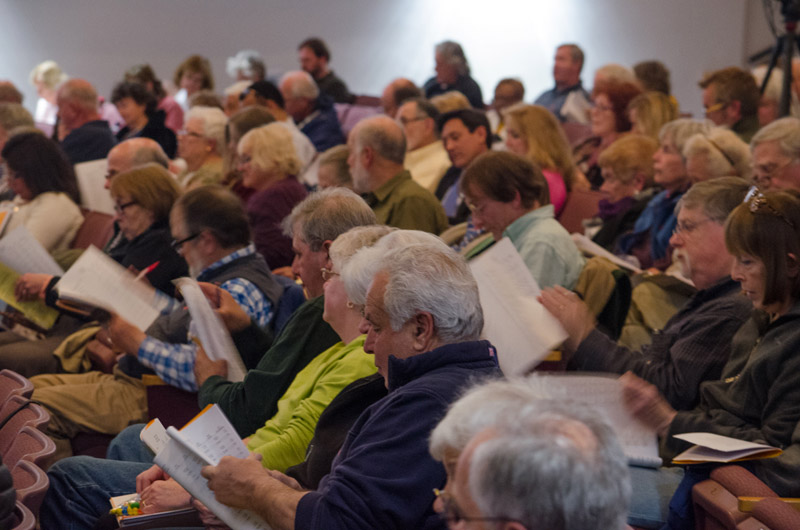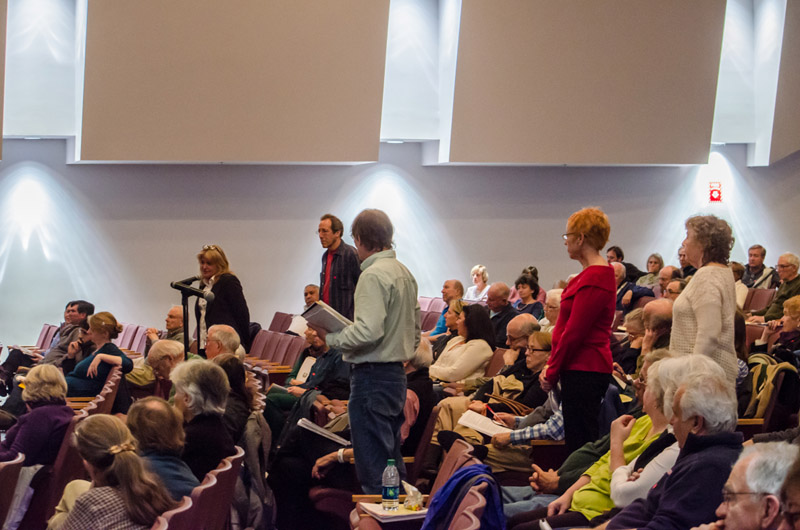Oak Bluffs voters were inquisitive and sometimes cranky at their annual town meeting this year, questioning budget expenditures and criticizing some town departments.
But 33 of 34 articles on the special and annual warrants were approved, including a $28.5 million operating budget.
Money to buy a beach rake, a zoning change to allow light manufacturing and Community Preservation Act projects were also approved.
As expected, a request for $40,000 to buy a beach rake for use on town beaches drew plenty of debate.
“Residents and visitors are here in large part because of our fine beaches, which are the most accessible on the Island,” said Richard Seelig, who leads an ad-hoc town beach committee that led the effort to buy the surf rake.
There was concern among town officials about whether the rake could be used without violating state environmental laws. Removing rocks from the beach could hasten erosion, some said, instead calling for the town to develop a comprehensive beach management plan.
“Something very positive has come out of this,” said conservation agent Liz Durkee. “If the board of selectmen, the parks commission and the conservation commission all get together and develop a beach management plan, that would be a huge asset for the town. I do not support the purchase of a beach rake at this time.”
Michael Santoro, chairman of the selectmen, agreed. “We don’t own a tractor, we don’t own a piece of equipment to pull that,” he said. “We buy the rake, we don’t get the permits, what are we going to do? We should get the permits before that.”
But for others, there was little appetite for waiting.
“The junk is on the beach now,” said Brian Hughes.
“We could wait for a plan, we could wait for a permit, we could wait and wait and wait,” said Gretchen Tucker Underwood. “But that beach is still there, and my grandchildren need to go to the beach.”
The article passed in a voice vote.
Also drawing spirited debate was an article to add manufacturing and light manufacturing by special permit to the bylaws that regulate the town business district.
The request came about because a group of Island entrepreneurs want to build a micro-distillery on the site of a former automotive garage at the corner of School street and Dukes County avenue.
Building inspector Mark Barbadoro advised the group that the distillery would classify as light manufacturing and would not be allowed under current zoning laws.

While selectmen reminded voters that the zoning change would apply to everyone, the debate centered on the proposed distillery.
Jeff Ferriell, president of the Martha’s Vineyard Camp Meeting Association, noted the proximity of the project to the Camp Ground. “I don’t think we would approve,” he said.
But property owner Scott Dario said the distillery would be an improvement. “It was an eyesore,” he said. “This would allow us an opportunity to change that.”
Planning board chairman Brian Packish noted that the special permit process would involve site reviews and public hearings.
“That will create a path for people to apply,” Mr. Packish said. “We felt very strongly that there needed to be an extra layer of protection. I think that’s responsible, I think that’s well thought through.”
Moderator Jesse Law called for a standing vote. A two-thirds vote is required to change zoning bylaws.
The article was approved 127 to 32.
Three articles were approved to complete a complicated land swap and settle a long dispute between the Martha’s Vineyard Hospital and residents of the nearby Windemere neighborhood.
Patrick King, who owns property in the neighborhood and believes the hospital illegally built its new $52 million facility and parking lot on a public road, is a vigorous opponent to the plan. Mr. King claims the error significantly devalued his land.
The land swap approved by voters Tuesday evening restored legal access to the property. But Mr. King was not persuaded.
“You’re being asked to grant for free, part of my road,” he said. “I’ve had my entire investment in my retirement taken from me. What would you do if this was your home?”
Several public officials spoke in favor of the land swap as a carefully crafted solution to rectify a problem.
“We’re giving Mr. King legal access to his property,” said Fred Hancock, who was chairman of the Martha’s Vineyard Commission which also reviewed the plan. “He doesn’t want to take yes for an answer.”
“What this does is it cleans up something lingering from the construction of the hospital,” said Mr. Packish. “To go back where we were, literally means to take the hospital down.”
Discussion on the annual operating budget sparked complaints about town services.
Christine Todd criticized the way the town handles disbursement of Steamship Authority ferry embarkation fees, which come from a surcharge on passenger tickets and are returned to port towns. Ms. Todd said in Oak Bluffs the fees appear to be designated exclusively for the police department.
“Other towns on the Island, they have a committee [to recommend how the fees are used],” she said. “I’m wondering why we don’t do that. There are several constituents in our community that are trying to make our town better in more ways than security.”
The police department also caught criticism over a request for three new police cruisers and new body armor.
“I’d like to know the members of my police force better, but I have little opportunity to meet them because they are mostly concealed in patrol cars behind dark glass,” said Sam Low. “The kinds of stealthy patrol cars we’re purchasing with the paint scheme and identifying letters designed to disguise them, the presence of officers in flak jackets on the street, when they are on the street at all, and the weapons they bear, all resemble more of a military force than a local small town police force.”
Police chief Erik Blake called the statements unfair.
“As far as the way they look, for every negative comment we get, we get just as many if not more positive comments,” he said, adding: “As far as community policing goes, I would put us up against anybody on Martha’s Vineyard. If you see an officer going to a call and they’re not saying hi to you, it’s because they’re going to a call.”
Voters approved $1 million in spending recommendations from the community preservation committee, including $67,698 to replace streetlights along Sea View avenue with historically correct lanterns. Community Preservation Act (CPA) projects are funded from a three per cent surcharge on property tax bills, partially matched with funds allocated from the state budget.
The town’s new website drew criticism during a request for $15,000 to hire a part-time assistant for the IT department.
“We’re barely crawling with our website,” Ms. Todd said. “Now we’re asking for $15,000 for what, to get it to walk?”
IT director Travis Larsen said his duties involve all town technology, including systems used by the police, fire, and ambulance department.
“I do have duties beyond the website,” Mr. Larsen said.





Comments
Comment policy »